НАУЧНО-ОБРАЗОВАТЕЛЬНОЕ КУЛЬТУРОЛОГИЧЕСКОЕ ОБЩЕСТВО
НАУЧНАЯ АССОЦИАЦИЯ ИССЛЕДОВАТЕЛЕЙ КУЛЬТУРЫ
Научное рецензируемое периодическое электронное издание
Выходит с 2014 г.

Гипотезы:
ТЕОРИЯ КУЛЬТУРЫ
Э.А. Орлова. Антропологические основания научного познания
Дискуссии:
В ПОИСКЕ СМЫСЛА ИСТОРИИ И КУЛЬТУРЫ (рубрика А.Я. Флиера)
А.В. Костина, А.Я. Флиер. Тернарная функциональная модель культуры (продолжение)
Н.А. Хренов. Русская культура рубежа XIX–XX вв.: гностический «ренессанс» в контексте символизма (продолжение)
В.М. Розин. Некоторые особенности современного искусства
В.И. Ионесов. Память вещи в образах и сюжетах культурной интроспекции
Аналитика:
КУЛЬТУРОЛОГИЧЕСКИЕ РАЗМЫШЛЕНИЯ
А.Я. Флиер. Социально-организационные функции культуры
М.И. Козьякова. Античный космос и его эволюция: ритуал, зрелище, развлечение
Н.А. Хренов. Спустя столетие: трагический опыт советской культуры (продолжение)


М.И. Козьякова
Эволюция экрана: мифы современной культуры
Аннотация. Проделав на протяжении столетия путь от простого защитного приспособления до завершающего элемента сложнейших электронных устройств, экран предстает как символ информационной эпохи. Экранная цивилизация возвращает человека к архаике мифологического, непосредственно переживаемого восприятия мира. В статье рассмотрена эволюция экрана, формирование экранной культуры и ее слагаемые, виртуальность и образность современных медийных средств с целью раскрытия актуализации архаики.
Ключевые слова. Экран, экранная культура, образность, мифологизм, магия, кинематограф, телевидение.
Распространение новых технологий коренным образом меняет жизненную среду человека, его поведенческие стереотипы, особенно в том, что касается создания нового виртуального пространства. Виртуализация становится знаком времени, приметой глобального дискурса. В своей известной работе «Средство само есть содержание» М. Маклюэн отмечает неоархаические тенденции, связанные с развитием электронных технологий: «Мы переместились вновь обратно в акустическое пространство. Мы начали снова испытывать первобытные чувства, племенные эмоции, от которых нас отдалили несколько веков грамотности» [1]. При всей неоднозначности маклюэновской концепции акустического и визуального коммуникативного пространства, терминологической и феноменологической тождественности рациональности и видимости, его прогноз по поводу архаических трендов, сделанный полвека назад, можно считать оправданным.
Живем ли мы сейчас в «глобальной деревне» – дискуссионный вопрос, хотя отказ от рационализма и детерминизма, евро- и этноцентризма, как и от всякой центрированности в принципе, пессимизм в отношении технического и социального прогресса характерны для ситуации постмодерна. В то же время искусственная реальность, созданная новейшими технологиями, ее моделирование и трансформация, эстетическое экспериментирование составляют важнейший модус постмодернистской практики. Виртуальный мир все активнее вторгается в обитаемое пространство человека, определяя жизненные реалии: мы все «живем внутри Универсального компьютера». На основе синтеза компьютера и видеотехники, средств связи и каналов передачи информации складывается экранная культура. Ее центральным элементом, точкой сборки, объединяющей технический и смысловой ресурс, материализующей и транслирующей аудиовизуальный контент, является экран.
Экран представлял собой некогда простую отражающую, отгораживающую поверхность, нечто вроде щита, заслона, ширмы – ткани, натянутой на раму [2], как, например, экран у камина, экран плотины. С развитием техники функциональное назначение экрана расширяется, сохраняя, тем не менее, свое значение плоскости, предмета, предназначенного для защиты человека или технических устройств от некомфортного, вредного или опасного воздействия среды – как, например, шумозащитные экраны. Новые важные функции, приобретенные им, относятся к преобразованию энергии: это разнообразные тепловые, электрические, магнитные, другие виды и типы экранов. Однако свое важнейшее, качественно иное содержание, свой новый онтологический модус экран получает вместе с развитием электронной техники. Он становится устройством для показа изображений, для демонстрации визуального ряда, отражающего некое пространство, находящееся за пределами зримого окружения.

Внутри современного экрана рождается иной, виртуальный мир, а сам экран служит границей, соединяющей наш, реальный и другой, «заэкранный» мир. Наблюдатель отделен от него экранной преградой и, останавливаясь перед ней, может проникнуть в «зазеркалье», соприкоснуться с ним лишь визуально, хотя современная техника обеспечивает и звуковое сопровождение: его можно услышать. Экран телефона, телевизора, компьютерный монитор служат для предоставления информации, представляя собой важнейшее средство и одновременно условие ее получения. Большие и маленькие – огромные киноэкраны и электронные табло, которые устанавливаются в местах большого скопления людей; миниатюрные дисплеи навигатора и мобильного телефона; экраны телевизора и мониторы компьютера, дисплеи в банкоматах и платежных терминалах, в уличной рекламе – они окружают нас повсюду, выступая посредниками в повседневной коммуникации.
Экранные медиа делают возможным регулярный обмен информацией, события из тех или иных регионов, получая известность далеко за пределами своих локальных пунктов, вливаются в поток мировых новостей. Визуализированная информация становится доступной, образуется единое информационное поле. Формируя новую ментальность потребителя, интенсификация информационных контактов ведет к сдвигам в массовом сознании. Социальные связи все более определяются и опосредуются информационными: у населения возникает потребность в регулярном обращении к своему главному контрагенту, коммуникатору, медиатору – к экрану. «Жить в обществе», быть включенным в общественную жизнь означает практику регулярного подключения к информационным потокам, потребление (т.е. восприятие, усвоение, использование) проходящей по ним информации. На это не требуется много усилий. Нажать на кнопку телевизора, телефона, включить компьютер – информационное потребление в известной степени пассивно, оно не предполагает больших затрат физической или духовной энергии. Но статус потребителя меняется кардинально. Автономный субъект становится объектом воздействия аудиовизуальных электронных технологий, помещающих его в пространство массовой культуры.
Сырой поток реальности, пропущенный через масс-медийные каналы, так или иначе вербализуется и визуализируется. Он подвергается кодированию, проходит селекционную обработку, ранжируется в соответствии с теми или иными политическими, идеологическими или коммерческими целями. Преследуя их, средства массовой информации создают собственный продукт – мифологемы и мифы массовой культуры, активно внедряемые в сознание реципиента, формирующие феномен «ложного сознания». Модели и знаки реального мира заслоняют собой репрезентируемый объект, отделяются от него. Они обретают собственную жизнь, зачастую слабо коррелирующую с породившим его объектом. Новый универсум коммуникаций наполняет виртуальное пространство фантомами, получившими название симулякров – означающего без означаемого.
Проделав на протяжении столетия путь от простого и примитивного защитного приспособления до завершающего элемента сложнейших электронных устройств, экран предстает как метафизическое воплощение современного типа культуры, как символ и синоним информационной эпохи. Информационная эпоха началась не с компьютеризации и Интернета, а с «массовой» культуры, – не без основания утверждал М. Кастельс; последняя же в послевоенный период XX в. базировалась главным образом на экранных системах: кино, ТВ, видео. [3]. Эту же взаимосвязь отмечал и М. Маклюэн: «Печатная техника создавала публику. Электронная техника создала массу» [4]. Электроника, электронная техника, снабженная экраном, становится материальным носителем нового типа культуры, ее разнообразных форм: художественной, научной, повседневной. Именно экран оказывается центральным репрезентантом аудиовизуального контента не только в развлекательной, коммуникативной, но также и в деловой сфере, обеспечивая предоставление профессиональной информации – показания, сведения, данные, справки, извещения, уведомления и т. п. Экран на рабочем месте уже давно превратился в примету времени: «Мы можем дебатировать, является ли наше общество обществом представления или симуляции, но несомненно, что оно является обществом экрана» [5].
Современный экран наследует многие свойства своих исторических прототипов – технических устройств, отстоящих от нашего времени на двести-триста лет. Они позволяли устраивать развлечения, популярные в XVIII и XIX вв. – это были представления с «волшебным фонарем», диаскопом, примитивным проектором. А если опуститься еще глубже по шкале времени, то можно обнаружить аналоги первых экранных аппаратов – в окнах перспективы Альберти. В эпоху Ренессанса Л. Б. Альберти стал первым теоретиком центральной перспективы. Он утверждал, что картина подобна окну, через которое мы смотрим на часть видимого мира: «Сначала там, где я должен сделать рисунок, я черчу четырехугольник с прямыми углами такого размера, какого хочу, и принимаю его за открытое окно, откуда я рассматриваю то, что будет на нем написано» [6].

Линейная перспектива эпохи Возрождения на долгие годы определила специфику новоевропейской живописи, а также зафиксировала формат, в котором позднее стала предлагаться визуальная информация. Прямоугольник с более длинной стороной по горизонтальной оси соответствовал «пейзажному» формату, в котором следовало запечатлевать пейзажи, а также сцены, относящиеся к историческому, бытовому, батальному жанру; противоположный формат – с более длинной стороной по вертикальной оси, получил название «портретного», что соответствовало содержанию данного типа картин. Оба эти формата наследует современный экран – как и прежде, это «окно в мир», прямоугольник с плоской поверхностью, рассчитанный на фронтальное восприятие. На смену экрану со статичным изображением – так называемому «классическому» (Л. Манович), приходит «динамический», на котором проецируется движение. Эволюция экрана детерминируется технологическим развитием, и сама возможность перехода от неподвижной, статичной к движущейся картинке была напрямую связана с успехами в развитии электронной техники. Так формируется экранная культура, все глубже и глубже проникающая во все поры общества.
Феномен экранной культуры не имеет пока своего устоявшегося академического определения. Более того, даже в диссертациях, посвященных данной теме, авторы не дают четкой формулировки, подходя к этому явлению через всевозможные косвенные опосредования: «информатизация культуры выступает не только как результат использования информационной технологии в сфере культуры, но и, вместе с тем, как непременное условие дальнейшего развития информатизации общества… Важнейшим элементом информационной культуры является экранная культура – производство, хранение и трансляция в аудиовизуальной форме с помощью экранных технических средств культурных ценностей» [7]. Данный пассаж сразу же провоцирует вопрос: а разве экранные технические средства производят, хранят и транслируют только «культурные ценности»? Как быть с тем огромным массивом хаотичной, низкопробной, далеко не всегда благопристойной информации, рекламы, ангажированных и некомпетентных примитивов, гуляющих по интернету, присутствующих на телевизионных каналах?
Неудовлетворительна и иная дефиниция этой диссертационной работы, ставшая в известной степени типической: «Экранная культура является системой, составные элементы которой кино-, теле-, видео- и компьютерная культуры» [8]. Очевидно, что определение какого-либо явления не может базироваться на перечислении составных элементов феномена, тем более что отдельные «культуры», названные выше, представляют собой всего лишь некую сферу, составную часть информационного (экранного) континуума, и их разномасштабность, соподчиненность или же рядоположенность может быть дискуссионной.

Гораздо более содержательным представляется подход, предложенный почти тридцать лет назад в статье «Культура грядущего тысячелетия» (авторы А.В. Прохоров, К.Э. Разлогов, В.Д. Рузин), аккуратно обозначенный как «предварительное определение экранной культуры»: «Под ней мы подразумеваем тип культуры, основным материальным носителем текстов которой является не письменность, а «экранность». Эта культура основана … на системе экранных (плоскостных) изображений, … на так называемой «экранной речи», т.е. на временном потоке экранных изображений, который свободно вмещает в себя поведение и устную речь персонажей, анимационное моделирование, письменные тексты и многое другое. При этом основным признаком экранной культуры… является динамический, ежесекундно меняющийся, диалоговый характер взаимоотношений экранного текста с партнером» [9].
Конечно, текст, упомянутый в этой цитате, должен пониматься как интертекст Ю. Кристевой и Р. Барта, либо как гипертекст Т. Нельсона, активно используемый многими постмодернистскими теоретиками; различие в их трактовках здесь не принципиально. Но вот что является принципиальным в данном контексте: экранная цивилизация становится «image-oriented, ориентированной на зрительный образ» (У. Эко). Отмечая эту особенность, У. Эко апеллирует к М. Маклюэну, указывая, что тот еще в 1960-х годах в своей работе «Галактика Гутенберга» писал об ином типе восприятия – гиперцепции. Глобальное восприятие через образы телевидения и другие электронные средства приходит на смену линейному способу мышления, преобладавшему после изобретения печати [10].
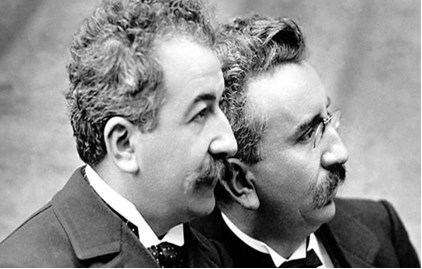
Экранную культуру формируют средства связи и каналы передачи информации, компьютер и видеотехника, то есть технические средства для записи, обработки, хранения и воспроизведения видео и аудиоинформации, в том числе кино и телевидение. Их объединение, синтез, складывающийся с развитием электронной техники, принимал различные формы на протяжении прошлого столетия. История экранной культуры начинается с появления кинематографа: это братья О. и Л. Люмьеры, первый сеанс синематографа в Париже 28 декабря 1895 г. Первые немые документальные короткометражные фильмы – «Выход работниц из ворот фабрики», «Игра в карты», «Кормление младенца», комический эпизод «Политый поливальщик», среди них был и знаменитый фильм «Прибытие поезда», вызвавший паническую реакцию. Как писал А. Тарковский, называя этот фильм гениальным, последний был снят просто в силу того, что были изобретены съемочная камера, пленка и проекционный аппарат. И, тем не менее, это была не просто техника или новый способ репродуцирования мира. Родился новый эстетический принцип: впервые в истории искусства, впервые в истории культуры человек нашел способ непосредственно запечатлеть время [11].

Время, его фиксация, остановка, сохранение, его особая акцентировка, трактовка, препарирование, возможность создать свой собственный авторский ритм, событийный ряд, или же просто внимательно рассмотреть какой-нибудь фрагмент, эпизод, произвольно вынутый и вновь отпущенный в неудержимый временной поток; найти то, что представляется важным, что не было увидено другими и, наконец, поделиться этим со зрителем – действительно, составляет квинтэссенцию кинематографа. Его начало было революционно. Гениально просто – пойманное экраном время: юное, только что родившееся кино по генотипу, вероятно, можно сравнить с современной трансляцией футбольного матча, с моментом повтора забитого в футбольные ворота гола.
Именно повтор, просто повтор, а не сам голевой момент. Повтор и только, но вы имеете возможность «остановить» время, то есть управлять, обладать им: конечно, «управление» условно, да и сам временной фрагмент будет касаться виртуального времени, но восприниматься зрителем оно может так же, как и его реальный прототип. Последний принадлежит «нашей», предстоящей нам, проходящей и преходящей, исчезающей реальности, а вот ее повтор дает нам возможность почувствовать себя его наблюдателями, выключенными из самого действия. Метафизически это не только наблюдение, но и «овладение» временем, хотя непосредственное восприятие экранной продукции происходит в большей степени не логическим, но эмоциональным путем.
Получение эмоции, аффекта от экранного творения реально, но само оно представляет собой лишь видимость, фикцию. Нечто иллюзорное, завораживающее зрителей, оказывает реальное действие, приносит результат – в таинственной способности воздействовать на людей и состоит магия экрана, его «волшебство». Зритель получает возможность присутствовать в иных мирах, «раздваивается», обретает иную «жизнь», отличную от его собственной и этих «жизней» может быть сколь угодно много. Наш современник привык к виртуальной повседневности и воспринимает ее буднично. Почти утрачено непосредственное чувство присутствия в ином пространстве и времени, в иной реальности, которое возникает при просмотре хорошего фильма, при погружении в его иллюзорность – речь не идет здесь о специальных способах создания 3D эффекта. Но зритель первых фильмов ощущал эффект присутствия непосредственно, особенно показательна реакция зрителей на фильм «Прибытие поезда», показательна, даже будучи в определенной ступени мифологизированной, на чем настаивают исследователи истории кинематографа.
Первоначально принципом синематографа, люмьеровского синематографа, являлась способность с максимальной точностью фиксировать реальность – «все как в жизни». Далее в аудиовизуальной культуре возникает оппозиция О. и Л. Люмьерам. Вызов бросает «Жюль Верн экрана»: профессиональный иллюзионист, поэт Ж. Мельес декларирует иное кредо — «в жизни такого не бывает». Жизненная реальность, представленная в кинопроизведении, получает интерпретацию и оценку, трансформируется в соответствии с замыслом автора. Кино, безусловно, является синтетическим искусством, использующим творческий потенциал других, старших по возрасту искусств: литературы и музыки, живописи и архитектуры, хореографии и театра. Сначала внимание было обращено преимущественно на литературу: инсценировались сюжеты литературных произведений и их персонажи; использовались также особые приемы съемки, появились крупные планы, монтаж.
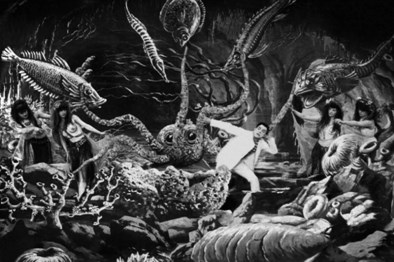
Кинематограф первых трех десятилетий – «великий немой»: отсутствие звука считалось специфической чертой экранного искусства этого времени. Во время расцвета немого кино, в 1920-е годы начали работать С. Эйзенштейн, В. Пудовкин, А. Довженко, Ч. Чаплин. Отсутствие звука возмещалось пластической выразительностью актерской игры, что отмечается как главная особенность актерской работы данного периода. «Немота» кинематографа заканчивается в конце 1920-х – начале 1930-х годов: на смену немого приходит звуковое кино. Новую эру открывает американская картина «Певец джаза» (1928 г.): средний, дипломатично говоря, художественный уровень этого произведения, не помешал ей совершить настоящий переворот в киноискусстве. Звуковые фильмы («токиз») получают восторженный прием, звуковое кино становится манией, но одновременно оно вызвало раскол во мнениях, противодействие среди признанных мастеров кинематографа. Ч. Чаплин резко выступил против: «Я ненавижу говорящие фильмы, они явились, чтобы испортить древнейшее искусство мира – искусство пантомимы; они уничтожают великую красоту молчания»; «говорящие» фильмы, которые хотят соединить театральную условность с реализмом кино, уродливы» [12]. Ведущие мастера – С. Эйзенштейн, В. Пудовкин и др. также осуждали введение звука.
Эти взгляды по прошествии многих десятилетий представляются странными, ведь звуковое кино создало новые возможности творчества и, несомненно, обогатило кинематограф. Тем не менее, для своего времени они были показательны, поскольку несовершенство звукового ряда диссонировало с достоинствами «великого немого», и мастера по существу выступали не против новых возможностей киноискусства, но против новшества, дезавуирующего и подменяющего искусство, против новой моды массовой культуры. Звук, экранная речь отрицает презумпцию космополитизма экранной среды, возвращает права национальным языкам, а вместе с ними в кинематограф неизбежно проникает национальная специфика, отражающая архетипические черты того или иного народа, особенности его мировосприятия, ценностных ориентаций, его мифологию и идеологию. Так, для американского кино типично использование сценарной формулы «happy end» (гриффитовское «счастливое спасение в последний момент»), отражающей, хотя и в весьма опосредованной форме, базовую прогрессистскую, витальную установку американского архетипа, в то время как европейское кино далеко не всегда обращается к данной модели.
Следующий этап в развитии экранной культуры – появление телевидения, получившего массовое распространение в США во второй половине 1940-х – первой половине 1950-х годов (в Западной Европе в 1950-е годы). Телевидение – родной брат кинематографа, но его отличают важные коммуникативные характеристики – трансляционность и доместикация. ТВ имеет возможность передавать события в режиме реального времени, отслеживать и наблюдать происходящие изменения – свойство, которого не имеет кинематограф, транслирующий всегда только прошлую, раз и навсегда запечатленную реальность. ТВ, как «видение на расстоянии», воплощает предельную скорость распространения информации, симультанность, возможность создавать для реципиента «эффект присутствия». Таким образом, появляется третий тип экрана – экран реального времени. Его техническим предшественником был радар, отслеживавший положение предмета в пространстве: «В случае с радаром мы впервые видим широкое использование… принципиально нового типа экрана, экрана, который постепенно начинает занимать господствующее положение в современной визуальной культуре – видеомонитор, компьютерный экран, дисплеи приборов» [13].

Вторая особенность ТВ связана с его ориентированностью на домашнее потребление. Домашний экран свободен от условностей в отличие от большого экрана кинотеатра, предполагающего жестко закрепленную позицию зрителя, требующего от него сосредоточения и подчинения экранной фабуле: эти условия не только диктуются общепринятыми нормами поведения, но и объективно необходимы для получения удовольствия от фильма. (В первую очередь предполагается получение удовольствия, эстетического удовольствия, поскольку речь идет о произведении искусства, хотя, возможно, фильм может быть не столько художественным, сколько коммерческим продуктом). Кроме того, место демонстрации фильма, кинотеатр принадлежит общественному пространству.
С телевизором все иначе: это, возможно, самое «домашнее» из всех экранных технических устройств: в отличие от ноутбука, смартфона он не «сопровождает» своего владельца в его передвижениях; в отличие от стационарного домашнего компьютера он в меньшей степени обращен к деловой сфере жизни. Уверенно расположившись в доме, в его центральной части, он собирает вокруг себя домочадцев; он – центр семьи, заменивший в этой функции семейный очаг. Телевизор может быть просто включен как фон, на него можно не обращать внимания, либо обращать лишь время от времени, когда удобно; передачи можно смотреть, уютно устроившись на диване или же, наоборот, на бегу, мимоходом, занимаясь другими делами. Он витализируется, превращается в некое подобие живого существа, напоминающего кота – привлекая внимание и создавая комфорт своим мурлыканьем, он всегда к вашим услугам.
По распространенности и доступности ТВ обогнало кинематограф: киноискусство все – таки «искусство», при всей условности номинирования в этом статусе отдельных произведений, при всей коммерциализации данной сферы, а телевидение не только и не столько искусство, сколько информационный канал. Телевизионная коммуникация предназначена, как правило, для чрезвычайно большой, глобальной аудитории, со всеми вытекающими отсюда особенностями. Она обязана удовлетворять в первую очередь массового «среднего» зрителя с его типологизированной установкой, с его тавтологичностью и «всеядностью» (В. Беньямин), характеризующих массовую рецепцию. Продуцируя в режиме нон стоп массовую культуру, современное телевидение – эфирное, кабельное, спутниковое, интернет-телевидение – вносит важнейший вклад в формирование глобальной медиасреды.
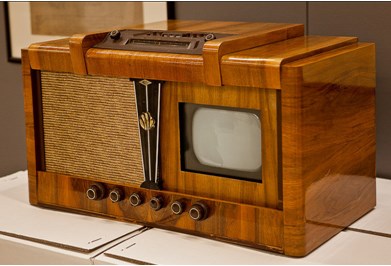
Технический прогресс оказывает решающее воздействие на дальнейшую экранную эволюцию, он связан был с усовершенствованием техники кинематографии, телевидения, с появлением и распространением видеоинформации на различных технических носителях (кассета, лазерный диск и др.) Развитие техники второй половины XX в. рождает масштабные инновации – происходит компьютерная революция. Компьютер, сохранив экран как неизменный атрибут электронной медийной технологии, приобретает новые функции – он может быть устройством для письма или чтения, для сбора информации, игровым модулем или транслятором фильмов и музыки. Экран компьютера взыскателен, он требует активных действий от своего «визави». Возникает диалог человека и машины, эффект общения «inter face» – интерактивного общения, которое также происходит с помощью экрана. Работая на компьютере, пользователь должен производить определенные действия, отслеживать результат – эти действия отличаются от «работы» с телевизором (конечно, если не считать «трудом» переключения кнопок на телевизионном пульте).
Компьютер создает условия для самой крупной, фундаментальной трансформации конца столетия — рождения Интернета, ставшего мейнстримом технологического, социального, гуманитарного развития. Трудно перечислить все новые возможности, практики, технологические решения и усовершенствования, произошедшие во всемирной паутине за последнюю четверть века – ее история «фантастична как по темпу изменений, так и по их содержанию» (Е. Дуков). Но Интернет – «это не просто техника связи и правила ее использования, но и люди, которые так или иначе владеют техникой и пытаются научиться говорить на ее языке». [14]. Наш современник взаимодействует с экраном компьютера не только с целью развлечения, досугового времяпрепровождения, но и использует его как рабочий инструмент, необходимый для получения информации в своей профессиональной деятельности, в образовательных целях.
Развитие экранной культуры, компьютеризация оказывают на общество двойственное, противоречивое воздействие. К позитивному можно отнести культурное разнообразие, о котором, в частности, говорится во Всеобщей декларации ЮНЕСКО: «киберпространство — это не только среда существования и распространения информации, но и средство осуществления коммуникации и обмена взглядами. Разнообразие информации в Интернете о различных культурах и ценностях позволяет человеку, оставаясь носителем своей культуры, представлять ее другим людям, и в свою очередь, знакомиться с другими культурами и испытывать их влияние» [15]. В современную эпоху благодаря глобальным системам компьютерной связи расширяется доступ к информации, мир становится единым и взаимосвязанным, но также сохраняется и его культурное разнообразие. Особенно ценно обретение новых возможностей общения, новых степеней свободы, связанных с выходом человека в глобальную информационную среду.
Глобальная медиа-среда и экран, как ее главный медиатор, играют решающую роль в демократизации культуры: экранная культура не может быть ограничена государственными, национальными, конфессиональными, иными рамками и барьерами. Она доступна всем, имеющим соответствующее техническое устройство и выход в сеть, обладающим минимальными навыками работы на компьютере. Интернет-пространство становится пространством свободной коммуникации, создает равные возможности в приобщении к культурным ценностям, в доступе к сокровищам музеев и библиотек, собраний и хранилищ. Это возможность знакомства с огромным количеством художественных творений – фильмов и спектаклей, музыкальных произведений. Наконец, это просто психотерапевтическая функция, стабилизация эмоционального, аффективного фона у его пользователей, что немаловажно в ситуации наличия всевозможных рисков и угроз.

Культура, связанная с экраном, имеет и негативные характеристики. Изначально заданный самой техникой эффект присутствия предполагал презумпцию достоверности предлагаемой виртуальной картины. Постепенно он терял свои аутентичные свойства, обретая возможности все более глубокого и всеобъемлющего искажения реальности. Однако сам дрейф, удаляющий наблюдателя от исходного нарратива, происходил настолько незаметно, что отклонение, замещение тех или иных аспектов не отменяли его первоначального статуса. Даже глобальная реконструкция, фальсифицирующая фактологический материал, не могла поколебать субъективное представление реципиента о его достоверности: таким образом эффект реальности аудиовизуального изображения превращался в механизм глобальной фальсификации.
В принципиально новой онтологической реальности неизбежные потери несет художественная культура: практика технического воспроизводства (В. Беньямин) стирает грань между копией и оригиналом и произведение искусства теряет ауру единственного и неповторимого. Тиражирование, нивелирующее художественную ценность артефакта, распространяется особенно широко вместе с ростом масштабов использования цифровых компьютерных технологий. Всевластие мультимедийной сферы ставит под вопрос художественный статус творения и творца. Новые возможности экранной техники обогащают палитру художественных практик, но служат ли они созданию шедевров, «является ли искусством то, что родилось в мультимедийной среде?», – задаются вопросом искусствоведы и критики.
Экран, формирующий общественное мнение, может приводить и с неизбежностью приводит к манипулированию людьми. Конечно, в первую очередь преследовались цели подчинения и контроля над «молчаливым большинством»: манипуляционные техники обращены были к «низам» общества, к массовой аудитории. Ее ориентировали на определенные социальные и культурные стереотипы, образцы, преподносимые как наиболее престижные, элитарные модели. Тотальность экрана делила общество на две неравноценные группы: активную и деятельную элиту и «всех прочих» – пассивное большинство. Двадцать лет назад актуальным был критерий, предложенный У. Эко: «В ближайшем будущем наше общество расщепится – или уже расщепилось – на два класса: тех, кто смотрит только телевидение, то есть получает готовые образы и готовое суждение о мире, без права критического отбора получаемой информации, и тех, кто смотрит на экран компьютера, то есть тех, кто способен отбирать и обрабатывать информацию» [16].
Сейчас интернет-технологии упростились настолько, что даже из тех, кто «смотрит на экран компьютера» далеко не все способны «отбирать и обрабатывать информацию», поскольку компьютерная революция, как считают специалисты, может привести и в какой-то мере уже приводит к снижению интеллектуального, общекультурного уровня людей, в определенной степени – к снижению грамотности. Так, с развитием всевозможных приспособлений, облегчающих нашу жизнь, человечеству в массе своей не приходится приобретать многие необходимые ранее навыки: с распространением калькулятора, например, канула в прошлое необходимость навыков устного счета и теперь работники, имеющие дело с расчетами, в том числе банковские служащие, бухгалтеры, продавцы, кассиры не всегда считают обязательным знать таблицу умножения.

Ориентация на зрительный образ, маклюэновская гиперцепция ослабляет логический потенциал, упраздняет когнитивизм и рационализм западного типа мышления. Показательно, что с подачи американских социологов появился нелицеприятный термин «видиоты», смысл которого понятен без подробных комментариев. Иной аспект – выделение новой идеологии «технофундаментализма», появление новой формы насилия – «виртуального насилия». Это могут быть группы, склоняющие молодых людей, подростков к суициду, к рискованным приключениям типа популярного квеста, некие порнографические сайты. Многочисленны примеры использования паутины террористическими организациями, криминалом, создающим мошеннические коммерческие схемы. В интернете небезопасно!
Экран делает зримой иную, отдаленную от непосредственного восприятия реальность, субстанциональность которой эфемерна, поскольку заключена в плоскости экрана. Момент ее существования краток, хотя краткость выражена здесь не в темпоральных характеристиках [17], а в субъектных: время ее бытия соотносится со временем зрительского внимания – экранная реальность онтологизируется посредством репрезентации, предъявления ее наблюдателям. Она делается зримой для определенной аудитории, и только так выявляется ее статус, тесно связанный с сознанием и восприятием субъекта. Визуализуется то, что не явлено в наличии «здесь и сейчас», а потому для данного локуса «заэкранье» не является объективной данностью, хотя внешне оно воспринимается как «новый способ репродуцирования мира» (А. Тарковский). На всю экранную сферу можно распространить характеристику, отнесенную к эффекту кинематографа: «от впечатления реальности к реальности впечатления» (Т. Жиро). Именно восприятие, впечатление конституирует ту последнюю, предельную реальность, точнее – ее отсутствие, манифестируемое шествием симулякров, сохраняющих внешнюю видимость объективной репрезентации артефактов.
Мир экрана – иллюзорный, искусственно сконструированный мир, основанный на вымысле его создателя и уже потому волшебный, хотя бы на нем демонстрировался соседний подъезд и происходящие там события. Мир экрана в этом плане магический – от латинского magia или же греческого mageia, которое переводится как колдовство, волшебство, поскольку творец экранной реальности, как и в кинематографе, использует совокупность особых креативных приемов для ее создания (перенесения, трансформации). Таким образом он может демонстрировать свой, «авторский», в определенной степени «рукотворный» иллюзорный мир, сотворенный им для зрителей. Интересны и показательны в этом плане те названия, которые так или иначе соприкасаются с историей современного экрана. Его отдаленный предок – проекционный аппарат (фонарь) – назывался волшебным фонарем, а кинотеатр, как и кинематограф, именовался некогда иллюзионом.
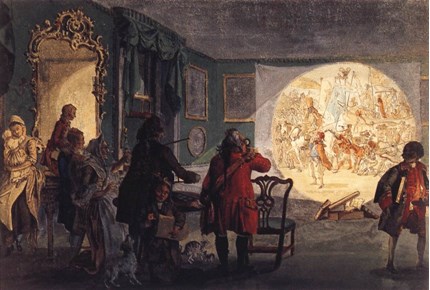
Магия экрана может интерпретироваться и в ином, переносном аспекте как сила экрана, обладающая необыкновенным эффектом воздействия на людей. Она включает в себя элемент суггестивного воздействия, содержащий нечто «сокровенное, неизъяснимое», как некогда определял суггестию теоретик символизма Ш. Моррис. Более, чем для творчества символистов, суггестия характерна для экранного искусства: последний с гораздо большим основанием можно назвать «продуктом суггестивной магии», чем «чистое искусство», если перефразировать Ш. Бодлера. Саму суггестию можно отнести к разряду современных эстетических категорий, хотя эстетика в данном контексте вторична: действительно, воздействие динамического экрана волшебно и необъяснимо – движущиеся картинки приковывают к себе внимание, привлекают, притягивают зрителя, который может следить за происходящим на экране просто потому, что там что-то происходит.
Магическим действием может обладать не только экран, но и зрелище, особенно искусство Переносный смысл магического действия чаще всего относят именно к сфере искусства, это – «высокая магия»: так, этому загадочному эффекту посвящена написанная С. Эйзенштейном в Москве в октябре 1944 г. заметка, названная «Магия искусства». Он пишет: «Магия здесь не пустой оборот речи. Ибо искусство (настоящее) искусственно возвращает зрителя на стадию чувственного мышления – его норм и видов, а оно и есть стадия магического взаимоотношения с природой. Когда вы достигли, par exemple, синестетического слияния звука и изображения, вы поставили восприятие зрителя в условия чувственного мышления, где синестетическое восприятие есть единственно возможное – дифференциации восприятий еще нет… чувства и сознание в таком случае – покорны и управимы почти в порядке транса. И из пассивно-магического состояния воспринимающего искусство одновременно – активно-магическое по владению и управлению зрителя магом-творцом» [18].
Под магию можно подпадать, она может превращаться в зависимость. Об этом пишет, например, Т.Л. Щепкина-Куперник в своих мемуарах «Театр в моей жизни»: «Я навек подпала под власть этого особенного чувства – «магии театра». Ее высказывание приводится в различных словарях как пример переносного значения слова «магия», хотя зависимость совершенно не обязательно будет связана с искусством. Отделенная от художественной сферы, магия экрана может обоснованно трактоваться как бледное профанированное подобие возвышенного, романтического чувства преклонения перед искусством, однако она гораздо сильнее по своему воздействию, шире по охвату аудитории, например, в телевизионной рекламе, в медийной информационной сфере. Скорее ее можно определить как эффект фасцинации, завораживания, возникающего при восприятии аудиовизуальной продукции.
Магия, как древнейший человеческий феномен, проходит сквозь все эпохи, онологизируется у всех народов, повторяется, возрождается, реконструируется на каждой новой фазе истории. Это не только древнейшая форма мировосприятия, отражающаяся в форме пережитков архаичных ритуалов, мифов, представлений и обрядов, как трактовал ее в своем классическом труде «Золотая ветвь» Дж. Фрезер. В Античной Греции под магией понимали совокупность таинственных обрядов, связанных с астрологией, народной медициной, гаданием. Понятие магии широко использовали в философских школах, таких, как неопифагорейской, школе неоплатоников, причем его не отождествляли с чародейством: магией было эзотерическое знание и соответствующие ему практики [19]. Некоторые магические практики были заимствованы христианством, такие, как поклонение мощам, святым местам, религиозным атрибутам.
В Средние века в Европе ярко выраженным было магическое сознание народных масс, соответствующие настроения и обряды описаны многими медиевистами. Но это также и сознание интеллектуалов: Франциск Ассизский, Тереза Авильская, Майстер Экхарт, немецкие и испанские мистики продолжали эту традицию в Средневековье; М. Фичино, Дж. Бруно, Дж. Пико делла Мирандола, Т. Кампанелла, Парацельс и многие другие – в эпоху Ренессанса. Начиная с эпохи Просвещения магия как иррациональная тема, как идея и практика была отодвинута с исторической авансцены, и не просто отодвинута, но «задвинута» в самый дальний и темный угол. На смену мрачному средневековью пришла пора Разума, в социально-философских учениях развивалась идея прогресса человеческого общества, клеймилось невежество и суеверия.
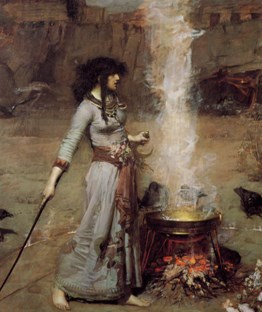
Вера в научно-технический прогресс постепенно приобретала черты религиозной харизмы, техника и наука становились кумиром нового времени, отождествлялись с идеей общественного благоденствия. Однако, несмотря не все достижения научно-технического прогресса, трехсотлетний этап культуры Нового времени, получивший название модерна, заканчивается кризисом. Глубоким, всеохватывающим кризисом, который задолго до его начала был диагностирован многими мыслителями, принадлежавшими к различным философским течениям – «философии жизни», аналитической психологии, феноменологии и др. Это был тот самый «Закат Европы» О. Шпенглера, прозвучавший грозным предостережением еще в начале XX в.
Одна из важнейших компонент кризисного процесса может быть отнесена к феномену человеческой природы, без обращения к которому не будет понятен смысл многих социальных, культурных, философских явлений: именно обращения к человеку как биологическому существу, вне зависимости от уровня его социальности, степени развития рефлексии, модуса его субъективации. В психике любого человека, помимо сознательного, рационального начала имеется иррациональное, бессознательное. Составляя важнейшую сторону жизнедеятельности, оно наличествует всегда, представляя собой реальность бытия. Современный человек, однако, все дальше и дальше уходил от природы и от собственного естества, идя по пути, ведущим в никуда – пути войны с природой, длившимся «от Гераклита до Хиросимы» (М. Серр): новая, техногенная искусственная среда во все возрастающей степени заменяла подлинную реальность, отчуждала человека от базиса его инстинктов.
Говоря о метафизических основах существования человека, К.Г. Юнг выделял одно из важнейших его условий – необходимость поддержания психического равновесия. Стремление к его достижению осуществляется инстинктивно, то есть иррационально. Эта иррациональная интенция реализуется в практике таких областей человеческой деятельности, как религиозная, мифологическая: «...люди с древнейших времен заботились о том, чтобы всякое решение с непредсказуемыми последствиями имело подстраховку подходящими под это мифами, религиозными по своей природе. Всегда и повсюду имелись ритуалы "входа и выхода", которые для невежд психологии – просветителей – были магией и предрассудком» [20].
По закону, который Юнг называл энантиодромией [21], все переходит в свою противоположность. Подавляя свое бессознательное, сознание борется с неотчуждаемой частью человеческой психики. Чем более вытесняется и подавляется бессознательно-иррациональное, тем сильнее оно становится. Если на протяжении истории поколений что-то систематически вытесняется или подавляется, оно приобретает все больший вес в человеческом обществе; и чем более полным и мощным становится вытеснение, тем более примитивный и архаический уровень бессознательного оказывается задействованным.
Техногенность постиндустриальной цивилизация коренным образом изменяет сознание современного человека. Многие исследователи отмечают поворот в сторону коллективного бессознательного, говорят о магический ренессансе, наступлении эпохи «новой иррациональности», мистицизма, о возвращении к до-рациональным формам мироощущения. Эти явления самым прямым и непосредственным образом связывают с электронными технологиями, с масс-медийными коммуникациями. «Невероятное усложнение технологических, экономических и социальных систем в процессе их постоянного частичного усовершенствования, надстраивания и достраивания постепенно приводит к тому, что эти системы становятся непостижимыми для самих их создателей и неподдающимися контролю с их стороны. Начинает господствовать новое магическое мировоззрение»; «чем дальше заходит прогресс, тем больше он порождает магическое мировоззрение» [22]. Некогда М. Вебер, отмечая важнейшие черты эпохи модерна, писал о нем, как о времени «расколдовывания» мира, когда человечество, освобожденное от магии и суеверий, обрело наконец-то возможность объективного познания явлений окружающей действительности, рационального объяснения ее феноменов.

Похоже, что на современном этапе период «расколдовывание» мира подошел к своему завершению, наступает новый «ледниковый период», архаика, в которой возвратный процесс магического «заколдовывания» вновь обретает свои права. «Поражает парадоксальное возрождение сегодня какой-то примитивной магической, оккультной, магнетопатической техники производства визуальных знаков, которые не имеют никакого смысла и не требуют рефлексии, зато эффективно вызывают те или иные психические реакции. Фантастический поворот к образам, к образной культуре становится сегодня реальной возможностью благодаря масс-медиа, которые продуцируют визуальные знаки… которые, вопреки реалистической теории познания, оказывают непостижимое воздействие на людей» [23]. Помимо констатации возвращения к до-рациональным формам мироощущения, примечательным в этой цитате представляется не только и не столько упоминание о реалистической теории познания, которая как будто бы утратила свою валидность, но о визуальных знаках, провоцирующих эмоциональную, магическую реакцию.
Действительно, здесь фиксируются важнейшие причинно-следственные связи. Ренессанс архаики происходит на пике технологической революции, при широком распространении самых современных электронных медийных средств. Экранные технологии, как правило, визуально ориентированы. Вопрос о видении чрезвычайно важен, он – один из центральных в истории западной цивилизации [24]: достаточно упомянуть, что вся деятельность человека тесно связана со зрением, почти всю информацию – до 90 % – мы получаем из этого источника. Увеличение визуальной коммуникации, ее доминирование однозначно влекут за собой активизацию коллективного мифологического сознания, свидетельствуют о повышении степени его императивности. Посредством визуализации человек возвращается к архаике магического, непосредственно переживаемого мироощущения.
Коммуникация, апеллирующая к образному восприятию мира, особенно характерна для массовой культуры. Возрожденная архаикой иррациональная интенциональность самым тесным образом связана с наличием экранной среды. Специальные выразительные средства экрана значительно усиливают эмоциональный эффект, поскольку экранная коммуникация использует акустический и визуальный каналы, синтезирует звук и изображение. Такого рода комплексное воздействие на чувственную сторону зрительского восприятия максимально эффективно – картинка, образ не требуют рефлексии, они могут воздействовать непосредственно на подсознание, минуя все интеллектуально-логические барьеры. Для кинематографа можно говорить об эмоционально-эстетическом отклике, о партиципации – участии, ассоциативности, образности мышления, тесно связанных с аффективностью сознания. Суггестивность и галлюциногенность кинематографа, его магическое, «одурманивающее» действие стали почти что общим местом, исследователи отмечали эти характеристики практически на всем протяжении его истории, в том числе можно сослаться на Р. Клера, З. Кракауэра, Ж. Бодрияра, на российских исследователей В. Михалковича, П. Огурчикова и др.
Магия и мистика экрана рассматривается в диссертационных исследованиях. В одной из последних работ, посвященных теме «Экранная культура как новая мифология», автор констатирует: «Магия экрана рождает новую мифологию, с помощью которой происходит утверждение моделей человеческого поведения в культуре, помещение индивидуального бытия в новую систему социальных и культурных координат» [25]. Миф и мифология актуализируются, миф, как и магия, знаменует собой не только синкретизм первобытной культуры: важным представляется его онтологическое основание, выделенное Р. Бартом. «...миф – это слово. Разумеется, не какое угодно слово... Однако с самого начала необходимо твердо заявить, что миф представляет собой коммуникативную систему, некоторое сообщение. И потому мифом может стать все, что покрывается дискурсом» [26].
Миф – выражение универсально человеческого, что передается от поколения к поколению, и потому «мифология есть коллективная, а не индивидуальная психика», – утверждает аналитическая психология [27]. Магия и миф возвращаются к нам снова и снова. Возвращается как аллегория, сказка, как философия и искусство, литература и идеология. Периоды демифологизации чередуются с периодами ремифологизации – бьется невидимый пульс культуры. Вытесненные, исчезнувшие с культурного горизонта, мифы уходят в тень, продолжая существовать в имплицитной форме. Затем маятник начинает движение в другую сторону, и они вновь оказываются на солнечной стороне. В такое время магический императив обретает второе дыхание: все магическое актуализируется, включается в культурный контекст, выдвигается в центр энергетического поля культуры. Сами мифы рефлектируются, трансформируются, получают новое и неожиданное звучание.
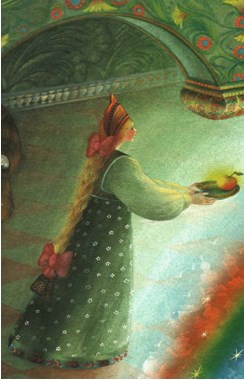
Аутентичные мифологические, сказочные сюжеты могут иметь неожиданное продолжение. Наука и техника XX в. смогли воплотить в жизнь многое из провидческих фантазий наших далеких предков, ведь, в принципе, для их реализации нет расстояний, национальных или государственных границ. Одним из подобных случаев представляется метаморфоза сказочного нарратива, когда идея, изложенная в русской сказке, «материализовалась» посредством новейших электронных технологий. Это «Сказка о серебряном блюдечке и наливном яблочке» из сборника А.Н. Афанасьева, лейтмотив которой – о мечта о видении, дальнем видении в режиме реального времени: «Катись-катись, яблочко, по серебряному блюдечку, показывай мне города и поля, леса и моря, и гор высоту и небес красоту!» [28].
Очевидно, что мифологемы не возникают на пустом месте, они питаются соками жизненных реалий, в то же время их корни располагаются в глубинах иррациональной психической сферы; они служат в известной степени мостиком, связующим звеном между реальностью и коллективным бессознательным. Вероятно, можно согласиться со смелым утверждением, что «технические достижения современности сотворены не только инженерной мыслью, но и коллективным бессознательным. Оно породило множество фантазий и мифов, ныне реализованных инженерной мыслью» [29].
Мечта о дальнем видении представляла на протяжении столетий устойчивый архетип, она фигурирует в качестве распространенного сюжета у разных народов [30]. Заклинание героини из «Сказки о серебряном блюдечке и наливном яблочке» дает эстетическую формулу русского народного представления о прекрасном мире: «Катится яблочко по блюдечку, наливное по серебряному, а на блюдечке все города один за другим видны, корабли на морях и полки на полях, и гор высота и небес красота; солнышко за солнышком катится, звезды в хоровод собираются – так все красиво, на диво – что ни в сказке сказать, ни пером написать». В конце сказки волшебный характер диковинки соотносится более не с телевизионной, но с компьютерной репрезентацией, с возможностью интерактивного общения, выбора визуального материала, предполагающего наличие своеобразного «меню» пользовательского контента: «“Что ты, царь-государь, хочешь видеть: города ль твои крепкие, полки ль твои храбрые, корабли ли на море, чудные ль звезды на небе?”»
Мифологема главного артефакта – волшебного серебряного блюдечка и наливного яблочка, способных показать весь мир, настолько глубока и поэтична, что сказка обрела не только фольклорную, но и литературную версию. Она получила стихотворное переложение и вошла в поэтический сборник К. Бальмонта «Зарево Зорь».
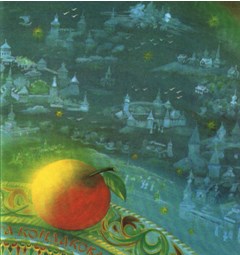
«Наливное яблочко, ты катись, катись,
Все катись ты посолонь, вверх катись и вниз.
Ты гори, показывай, как горит заря,
Города показывай, лес, поля, моря.
Ты катись, показывай гор высоту,
Ты катись, показывай Небес красоту» [31].
Будучи размещена в конце сборника, «Сказка» художественно обрамляет, завершает его, и этот композиционный прием позволяет закончить монолог поэта обращением к фольклорной, сказочной традиции. В народной интерпретации волшебство удваивается: магическое действо с серебряным блюдечком и наливным яблочком отражает всю волшебную красоту окружающего мира Переведя эти коннотации в контекст экранной магии нашего времени, можно продолжить тему «яблочной» специфики: американская корпорация Эппл, пионер в области производства компьютеров, телефонов, программного обеспечения, использует броский логотип яблока. Случайно выбранное название яблока [32] было позднее удачно интерпретировано как тема особой креативности этой легендарной компании, прославленной благодаря инновационным технологиям и эстетичному дизайну, занимающей первое место в мире по рыночной капитализации.

Эффектный логотип надкушенного яблока, конечно, может восприниматься как особая способность, особый дар к инновационным стратегиям, ведь яблоко в библейской и средневековой христианской традиции символизировало знания, мало или вовсе недоступные человеку. Но современный экран, как и его прототип из сказки, может показывать человеку всю вселенную, большую и малую, недостижимую в ракурсе его непосредственного наблюдения. И в этой связи сам собой возникает вопрос: если целое, наливное яблоко способно было демонстрировать красоту «Божьего мира», то какую реальность способно отразить надкушенное яблоко, ставшее символом наиболее престижных электронных медиа?
В статье в качестве иллюстраций использовались произведения А. Беклина «Остров мертвых»; А. Дюрера «Художник, рисующий лютню»; П. Сандби «Волшебная лотерна»; Д. У. Уотерхауса «Магический круг»; рисунки О. Кондаковой; скульптура Л. Б. Альберти; фотография братьев О. и Л. Люмьер; кадры из фильмов «Прибытие поезда», «Двести миль под водой, или Кошмар рыболова»; изображения каминного экрана, радара, телевизора, компьютера, ноутбука.
ПРИМЕЧАНИЯ
[1] Маклюэн М. Средство само есть содержание // Информационное общество. Сб. М.: АСТ, 2004. C. 345.
[2] Франц. еcran может переводиться как ширма. См., например: Большой энциклопедический словарь. М.: Наука, 2000.
[3] Кастельс М. Информационная эпоха: экономика, общество и культура. М.: ГУ ВШЭ, 2000. С. 316.
[4] Маклюэн М. Указ. соч. С. 346.
[5] Манович Л. Археология компьютерного экрана // Новые аудиовизуальные технологии: Сб. статей. СПб.: «ДМИТРИЙ БУЛАНИН», 2011. С. 55.
[6] Альберти Л.Б. Три книги о живописи // Мастера искусства об искусстве: В 7 т. Т. 2. Эпоха Возрождения. М.: Искусство, 1966. С. 29.
[7] Культурное и языковое разнообразие в информационном обществе. Министерство культуры и массовых коммуникаций РФ, Рос. ком. Программы ЮНЕСКО «Информация для всех», СПб., 2004 [Электронный ресурс]. URL: http://sif.vniidad.ru›index.php? … notices/index/IdNotice.
[8] Там же.
[9] Прохоров А.В., Разлогов К.Э., Рузин В.Д. Культура грядущего тысячелетия // Вопросы философии. 1989. № 6.
[10] Эко У. От Интернета к Гуттенбергу: текст и гипертекст (отрывки из публичной лекции Умберто Эко на экономическом ф-те МГУ 20 мая 1998) [Электронный ресурс]. URL: http://philosophy.ru/library/eco/internet.html.
[11] Тарковский А. Запечатленное время // Новые аудиовизуальные технологии: Сборник статей. СПб.: «ДМИТРИЙ БУЛАНИН», 2011. С. 121-122.
[12] Садуль Ж. Жизнь Чарли. М.: Прогресс, 1965 [Электронный ресурс]. URL: http://itexts.net›avtor-zhorzh-sadul/232127-zhizn-charli.
[13] Манович Л. Указ. соч. С. 59.
[14] Дуков Е.В. Сеть: публика и искусство. М.: ГИИ, 2016.
[15] Культурное и языковое разнообразие в информационном обществе.
[16] Эко У. Указ. соч.
[17] В свернутом, сжатом виде, в потенции, оно может храниться бесконечно долго, практически вечно, особенно если речь идет о современных носителях информации. Вспомнить можно также о фильмах, «положенных на полку», которые получают известность лишь постфактум, когда кончается их «заточение».
[18] Юнг К.Г. Настоящее и будущее /Аналитическая психология. М: Мартис, 1995.
[19] Как отмечается в Словаре античности, только с III в. нашей эры магия стала ассоциироваться с колдовством. Сам термин происходит от названия жреческих каст в Мидии, в Персии. См.: Словарь античности. М.: Прогресс, 1989.
[20] Юнг К.Г. Структура психики и архетипы. М.: Академический Проспект, 2007. C. 125.
[21] Энантиодромия – бег навстречу. Идея энантиодромии принадлежит Гераклиту.
[22] Ионин Л.Г. Новая магическая эпоха // Логос. 2005. № 2 (47). С. 157.
[23] Марков Б.В. Человек в эпоху масс-медиа (символы эпохи internet) // Информационное общество: Сб. М.: АСТ, 2004. С. 502.
[24] Его роль в истории западной цивилизации подробно рассмотрена в фундаментальной работе Е. Сальниковой «Феномен визуального. От древних истоков к началу XXI века». М.: Прогресс-Традиция, 2012.
[25] Огурчиков П.К. Экранная культура как новая мифология (на примере кино): автореф. дис… докт. культурологии. СПб., 2008.
[26] Барт Р. Мифологии. М.: Академический Проект, 2008. С. 252.
[27] Юнг К.Г. Настоящее и будущее /Аналитическая психология. М.: Мартис, 1995. С. 221.
[28] Народные русские сказки А.Н. Афанасьева: В 3 т. М.: Наука, 1984-1985. Т.3. С. 87.
[29] Михалкович В. Кино и телевидение, или о несходстве сходного // Новые аудиовизуальные технологии. СПб.: «ДМИТРИЙ БУЛАНИН», 2011. С. 367.
[30] В Энциклопедическом словаре Брокгауза и Ефрона зеркало, в котором можно видеть, что делается во всем мире, отнесено к восточному сюжету.
[31] Бальмонт К.Д. Зарево Зорь. М.: Гриф, 1912 [Электронный ресурс].. URL: http://ru.wikisource.org›wiki/Зарево_зорь_(Бальмонт).
[32] В таком случае телефонный номер фирмы шел в телефонном справочнике прямо перед «Atari», американской компанией по производству и изданию компьютерных игр.
© Козьякова М.И., 2018
Статья поступила в редакцию 2 марта 2017 г.
Козьякова Мария Ивановна,
доктор философских наук, профессор
Высшего театрального училища (института)
имени М. С. Щепкина при Государственном
Академическом Малом театре России
e-mail: markoz@yandex.ru

ISSN 2311-3723
Учредитель:
ООО Издательство «Согласие»
Издатель:
Научная ассоциация
исследователей культуры
№ государственной
регистрации ЭЛ № ФС 77 – 56414 от 11.12.2013
Журнал индексируется:
Выходит 4 раза в год только в электронном виде
Номер готовили:
Главный редактор
А.Я. Флиер
Шеф-редактор
Т.В. Глазкова
Руководитель IT-центра
А.В. Лукьянов
Наш баннер:

Наш e-mail:
cultschool@gmail.com
НАШИ ПАРТНЁРЫ:
Мнение редакции может не совпадать с мнением авторов.
При полном или частичном использовании материалов ссылка на «Культуру культуры» обязательна.
© Научная ассоциация исследователей культуры, 2014-2024







